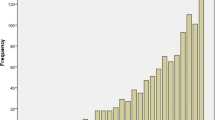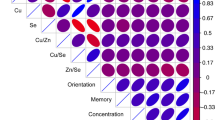Abstract
Background
A cross sectional study was conducted in a group of 317 subjects older than 60 in Malaysia, aimed to determine risk factors associated with cognitive impairment in older adults, focusing on trace elements and DNA damage.
Method
Cognitive decline was determined by Montreal Cognitive Assessment (MoCA). Oxidative stress markers (malondialdehyde-MDA and superoxide dismutase-SOD) were determined and DNA damage was assayed using Alkaline Comet Assay. Toenail samples were taken and analyzed using ICP-MS to determine trace element levels.
Results
A total of 62.1 % of subjects had cognitive impairment. Subjects with cognitive impairment had significantly higher levels of MDA and DNA damage as compared to the group with normal cognitive function; MDA (2.07 ± 0.05 nmol/L vs 1.85 ± 0.06 nmol/L) (p<0.05) and DNA damage (% Tail Density, 14.52 ± 0.32 vs 10.31 ± 0.42; Tail Moment, 1.79 ± 0.06 vs 1.28 ± 0.06) (p<0.05 for all parameters). However, the level of SOD among subjects with cognitive impairment (6.67 ± 0.33 u.e/min/mg protein) was lower than the level among those with normal cognitive functions (11.36 ± 0.65 u.e/min/mg protein) (p<0.05). Multiple logistic regression revealed the predictors for cognitive impairment among the subjects were DNA damage (Adjusted odd ratio [OR], 1.37; 95% confidence interval [CI], 1.18-1.59), level of trace elements in toenails namely, lead (OR, 2.471; CI, 1.535-3.980) and copper (OR, 1.275; CI, 1.047-1.552) (p<0.05).
Conclusion
High levels of lead and copper can lead to increase in oxidative stress levels and are associated with DNA damage that eventually could be associated with cognitive decline.





Similar content being viewed by others
References
United Nations Department of Economic and Social Affairs Population Division. (2013) World Population Ageing 2013. Demographic Determinants and Speed of Population Ageing, vol 2013. New York, New York
Swerdlow RH. The neurodegenerative mitochondriopathies. J Alzheimers Dis 2009;17(4):737–751. doi:10.3233/JAD-2009-1095 5710604376T63540 [pii]
Deary IJ, Corley J, Gow AJ, Harris SE, Houlihan LM, Marioni RE, Penke L, Rafnsson SB, Starr JM. Age-associated cognitive decline. British Medical Bulletin 2009;92(1):135–152. doi:10.1093/bmb/ldp033
Mattson MP, Magnus T. Ageing and neuronal vulnerability. Nature Reviews Neuroscience 2006;7:278–294
Meramat A, Rajab NF, Shahar S, Sharif R. Cognitive impairment, genomic instability and trace elements. The journal of nutrition, health & aging: 2014;1-10. doi:10.1007/s12603-014-0489-1
Lovell MA, Markesbery WR. Oxidative DNA damage in mild cognitive impairment and late-stage Alzheimer’s disease. Nucleic Acids Research 2007;35(22):7497–7504. doi:10.1093/nar/gkm821
Wang J, Xiong S, Xie C, Markesbery WR, Lovell MA. Increased oxidative damage in nuclear and mitochondrial DNA in Alzheimer’s disease. Journal of Neurochemistry 2005;93(4):953–962. doi:10.1111/j.1471-4159.2005.03053.x
Desport JC, Couratier P. Stress oxydant et maladies neuro-de´ge´ne´ ratives. clinical nutrition and metabolic 2002;16:253–260
McDaniel MA, Maier SF, Einstein GO. “Brain-specific” nutrients: a memory cure? Nutrition (Burbank, Los Angeles County, Calif) 2003;19(11):957–975
Smorgon C, Mari E, Atti AR, Dalla Nora E, Zamboni PF, Calzoni F, Passaro A, Fellin R. Trace elements and cognitive impairment: an elderly cohort study. Archives of gerontology and geriatrics Supplement 2004;(9):393–402
Nasreddine ZS, Phillips NA, Bédirian V, Charbonneau S, Whitehead V, Collin I, Cummings JL, Chertkow H. The Montreal Cognitive Assessment, MoCA: A Brief Screening Tool For Mild Cognitive Impairment. Journal of the American Geriatrics Society 2005;53(4):695–699. doi:10.1111/j.1532-5415.2005.53221.x
Razali R, Jean-Li L, Jaffar A, Ahmad M, Shah SA, Ibrahim N, Din NC, Jaafar NR, Midin M, Sidi H, Ahmad S. Is the Bahasa Malaysia version of the Montreal Cognitive Assessment (MoCA-BM) a better instrument than the Malay version of the Mini Mental State Examination (M-MMSE) in screening for mild cognitive impairment (MCI) in the elderly? Comprehensive psychiatry 2014;55(1):70–75
Rodushkin I, Axelsson MD. Application of double focusing sector field ICP-MS for multielemental characterization of humanhair and nails. Part I. Analytical methodology. Science of the Total Environment 2000;250(1–3):83–100
Chen K-L, Amarasiriwardena C, Christiani D. Determination of total arsenic concentrations in nails by inductively coupled plasma mass spectrometry. Biological Trace Element Research 1999;67(2):109–125. doi:10.1007/BF02784067
Singh NP, McCoy MT, Tice RR, Schneider EL. A simple technique for quantitation of low levels of DNA damage in individual cells. Experimental Cell Research 1988;175(1):184–191. doi:http://dx.doi.org/10.1016/0014-4827(88)90265-0
Beyer WFJ, Fridovich I. Assaying for superoxide dismutase activity: some large consequences of minor changes in conditions. Analytical Biochemistry 1987;161(2):559–566
Stocks J, Gutteridge JM, Sharp RJ, Dormandy TL. Assay using brain homogenate for measuring the antioxidant activity of biological fluids. Clinical Science and molecular medicine 1974;47(3):215–222
Goullé JP, Saussereau E, Mahieu L, Bouige D, Groenwont S, Guerbet M, Lacroix C. Application of Inductively Coupled Plasma Mass Spectrometry Multielement Analysis in Fingernail and Toenail as a Biomarker of Metal Exposure. Journal of Analytical Toxicology 2009;33(2):92–98. doi:10.1093/jat/33.2.92
Ghazali AR, Kamarulzaman F, Normah C, Ahmad M, Ghazali S, Ibrahim N, Said Z, Shahar S, Angkat N, Razali R. Levels of Metallic Elements and Their Potential Relationships to Cognitive Function among Elderly from Federal Land Development Authority (FELDA) Settlement in Selangor Malaysia. Biological Trace Element Research 2013;153(1–3):16–21. doi:10.1007/s12011-013-9642-7
Freitas S, Simões MR, Marôco J, Alves L, Santana I. Construct Validity of the Montreal Cognitive Assessment (MoCA). Journal of the International Neuropsychological Society 2012;18(02):242–250. doi:doi:10.1017/S1355617711001573
Hoops S, Nazem S, Siderowf AD, Duda JE, Xie SX, Stern MB, Weintraub D. Validity of the MoCA and MMSE in the detection of MCI and dementia in Parkinson disease. Neurology 2009;73(21):1738–1745. doi:10.1212/WNL.0b013e3181c34b47
Valenzuela M, Brayne C, Sachdev P, Wilcock G, Function FMoBotMRCC, Study A. Cognitive Lifestyle and Long-Term Risk of Dementia and Survival After Diagnosis in a Multicenter Population-based Cohort. American Journal of Epidemiology 2011;173(9):1004–1012. doi:10.1093/aje/kwq476
Sharp ES, Gatz M. The Relationship between Education and Dementia An Updated Systematic Review. Alzheimer disease and associated disorders 2011;25(4):289–304. doi:10.1097/WAD.0b013e318211c83c
Tosi A, Piraccini B. Biology of nail, vol 5. New York, 1999
Gao S, Jin Y, Unverzagt FW, Ma F, Hall KS, Murrell JR, Cheng Y, Shen J, Ying B, Ji R, Matesan J, Liang C, Hendrie HC. Trace element levels and cognitive function in rural elderly Chinese. Journals of Gerontology-Series A Biological Sciences and Medical Sciences 2008;63(6):635–641
Mocchegiani E, Bertoni-Freddari C, Marcellini F, Malavolta M. Brain, aging and neurodegeneration: Role of zinc ion availability. Progress in Neurobiology 2005;75(6):367–390. doi:http://dx.doi.org/10.1016/j.pneurobio.2005.04.005
Sfar S, Jawed A, Braham H, Amor S, Laporte F, Kerkeni A. Zinc, copper and antioxidant enzyme activities in healthy elderly Tunisian subjects. Experimental Gerontology 2009;44(12):812–817. doi:http://dx.doi.org/10.1016/j.exger.2009.10.008
Watt NT, Whitehouse IJ, Hooper NM. The Role of Zinc in Alzheimer’s Disease. International Journal of Alzheimer’s Disease 2011:10. doi:10.4061/2011/971021
Rahmann H, Rahmann M. Chemical Aspects of Neuronal Information Transmission in Synapses. In: Rahmann H, Rahmann M (eds) The Neurobiological Basis of Memory and Behavior. Springer-Verlag New York, New York, p 163
Tonkikh A, Janus C, El-Beheiry H, Pennefather PS, Samoilova M, McDo, 2012nald P, Ouanounou A, Carlen PL. Calcium chelation improves spatial learning and synaptic plasticity in aged rats. Experimental Neurology 2006;197(2):291–300. doi:http://dx.doi.org/10.1016/j.expneurol.2005.06.014
Khalil N, Morrow LA, Needleman H, Talbott EO, Wilson JW, Cauley JA. Association of Cumulative Lead and Neurocognitive Function in an Occupational Cohort. Neuropsychology 2009;23(1):10–19
Dobrowolska J, Dehnhardt M, Matusch A, Zoriy M, Palomero-Gallagher N, Koscielniak P, Zilles K, Becker JS. Quantitative imaging of zinc, copper and lead in three distinct regions of the human brain by laser ablation inductively coupled plasma mass spectrometry. Talanta 2008;74(4):717–723. doi:http://dx.doi.org/10.1016/j. talanta.2007.06.051
Schlief ML, West T, Craig AM, Holtzman DM, Gitlin JD. Role of the Menkes copper-transporting ATPase in NMDA receptor-mediated neuronal toxicity. Proceedings of the National Academy of Sciences of the United States of America 2006;103(40):14919–14924. doi:10.1073/pnas.0605390103
Hung YH, Robb EL, Volitakis I, Ho M, Evin G, Li Q-X, Culvenor JG, Masters CL, Cherny RA, Bush AI. Paradoxical Condensation of Copper with Elevated β-Amyloid in Lipid Rafts under Cellular Copper Deficiency Conditions: IMPLICATIONS FOR ALZHEIMER DISEASE. The Journal of Biological Chemistry 2009;284(33):21899–21907. doi:10.1074/jbc.M109.019521
Bandeen-Roche K, Glass TA, Bolla K, Todd AC, Schwartz BS. Cumulative lead dose and cognitive function in older adults. Epidemiology 2009;20(6):831–839
Lidsky TI, Schneider JS. Lead neurotoxicity in children: basic mechanisms and clinical correlates. Brain 2003;126(1):5–19
Ramesh GT, Manna SK, Aggarwal BB, Jadhav AL. Lead exposure activates nuclear factor kappa B, activator protein-1, c-Jun N-terminal kinase and caspases in the rat brain. Toxicology Letters 2001;123(2–3):195–207. doi:http://dx.doi.org/10.1016/S0378-4274(01)00395-2
Uttara B, Singh AV, Zamboni P, Mahajan RT. Oxidative Stress and Neurodegenerative Diseases: A Review of Upstream and Downstream Antioxidant Therapeutic Options. Current Neuropharmacology 2009;7(1):65–74. doi:10.2174/157015909787602823
Schuessel K, Leutner S, Cairns NJ, Müller WE, Eckert A. Impact of gender on upregulation of antioxidant defence mechanisms in Alzheimer’s disease brain. Journal of Neural Transmission 2004;111(9):1167–1182. doi:10.1007/s00702-004-0156-5
Sultana R, Reed T, Butterfield DA. Redox Proteomics and Metabolic Proteins in Brain of Subjects with Alzheimer’s Disease, Mild Cognitive Impairment, and Models Thereof. In: Neural Degeneration and Repair. Wiley-VCH Verlag GmbH & Co. KGaA, 2008;pp 181–207. doi:10.1002/9783527622467.ch9
Lee LK, Shahar S, Rajab N. Serum folate concentration, cognitive impairment, and DNA damage among elderly individuals in Malaysia. Nutrition Research 2009;29(5):327–334. doi:http://dx.doi.org/10.1016/j.nutres.2009.05.006
Simpson JE, Ince PG, Matthews FE, Shaw PJ, Heath PR, Brayne C, Garwood C, Higginbottom A, Wharton SB, Function MRCC, Ageing Neuropathology Study G. A neuronal DNA damage response is detected at the earliest stages of Alzheimer’s neuropathology and correlates with cognitive impairment in the MRC-CFAS ageing brain cohort. Neuropathology and Applied Neurobiology:n/a-n/a. 2014;doi:10.1111/nan.12202
Mulware SJ. Trace elements and carcinogenicity: a subject in review. 3 Biotech 2013;3(2):85–96. doi:10.1007/s13205-012-0072-6
Dreosti IE. Free Radical Pathology and The Genome. In: Dreosti IE (ed) Trace Elements, Micronutrients, and Free Radicals. Humana Press Inc, New York, 2012;pp 149–169
Brezova V, Valko M, Breza M, Morris H, Telser J, Dvoranova D, Kaiserova K, Varecka L, Mazur M, Leibfritz. Role of Radicals and Singlet Oxygen in Photoactivated DNA Cleavage by the Anticancer Drug Camptothecin: An Electron Paramagnetic Resonance Study. The Journal of Physical Chemistry B 2003;107(10):2415–2425. doi:10.1021/jp027743m
Author information
Authors and Affiliations
Corresponding author
Rights and permissions
About this article
Cite this article
Meramat, A., Rajab, N.F., Shahar, S. et al. DNA damage, copper and lead associates with cognitive function among older adults. J Nutr Health Aging 21, 539–545 (2017). https://doi.org/10.1007/s12603-016-0759-1
Received:
Accepted:
Published:
Issue Date:
DOI: https://doi.org/10.1007/s12603-016-0759-1




